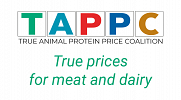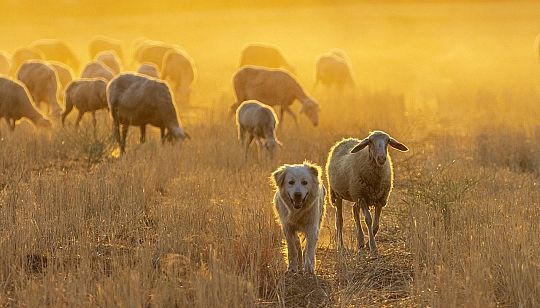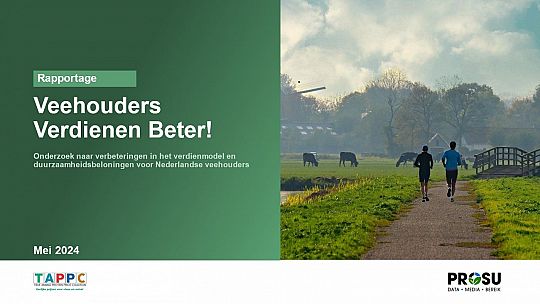Survey: farmers want levy on meat & dairy to reflect costs of animal welfare
53% of Dutch livestock farmers support higher VAT on meat, dairy, and eggs for better animal welfare and income
A survey of nearly 400 Dutch livestock farmers, representative of the entire community of dairy- pig- and poultry farmers, reveals that a majority are in favour of higher subsidies for better animal welfare and environmental sustainability, provided they are funded through a VAT tax increase on meat, dairy, and eggs. The idea is that this price increase would contribute to a fair income for farmers. Farmers are willing to support producing high-quality, animal- and eco-friendly meat and dairy, as long as it becomes the norm. They don’t view a price increase for consumers as a threat, but rather as a necessary condition to provide higher quality in terms of animal welfare and the environment. This is the conclusion of a report titled 'Farmers deserve better!' or the Dutch version: 'Veehouders Verdienen Beter! Onderzoek naar verbeteringen in het verdienmodel en duurzaamheidsbeloningen voor Nederlandse veehouders' by marketing agency Prosu, commissioned by TAPP Coalition.
Support for German animal welfare plan with higher VAT on meat and dairy
Most striking is the support for a tax measure similar to an existing German model, promoted by several German agriculture ministers. This involves a few extra cents on meat, dairy, and eggs sold in supermarkets, to improve animal welfare and increase farmers' income. In Germany, some agricultural organizations support this animal welfare levy, where consumers pay slightly more through a VAT increase on meat, dairy, and eggs. The tax revenue is used to compensate farmers for 20 years for animal- and eco-friendly barn modifications, both in Germany and abroad. This also applies to farmers exporting food to Germany. When asked if this plan would be a good idea for the Netherlands, 53% of farmers answered positively. The survey shows that nearly half of all Dutch livestock farmers export food to Germany, and most hope that any future German subsidies for animal- and eco-friendly barns would also apply to them. A consumer levy on meat and dairy is preferred by most farmers over an environmental tax that farmers themselves would have to pay, if the environmental costs of meat are to be accounted for. Finally, about 80% of farmers wish for EU import tariffs on meat, dairy, eggs, and soy from countries with lower environmental or animal welfare standards than those in the EU.
The survey shows that a majority of Dutch farmers support environmentally friendly taxes in both the Netherlands and the EU. There is overwhelming support for new legal obligations for supermarkets to ensure fair prices, leading to better farmer incomes. Two-thirds of farmers report not receiving a fair price for meat, dairy, and eggs. They believe that only by receiving at least 10-20% higher prices for their products would this be possible. The survey offers promising solutions through the market and the government—important work for a new Minister of Agriculture, Fisheries, Food Security, and Nature and new politicians and Commissioners in Brussels. The Prosu report also aligns with the recommendations of the report of the Strategic Dialogue on the Future of Agriculture presented last week to bring sustainability goals in line with farmer income support.
TAPP Coalition and fair meat prices
The survey was commissioned by TAPP Coalition, which, together with 73 partners, has been advocating for a fair price on meat and dairy for five years, including all societal external costs. On May 29, TAPP Coalition celebrated its anniversary with a conference in Amsterdam, where the survey report was presented. Jeroom Remmers, director of TAPP Coalition: "We are pleased that 53% of livestock farmers in the Netherlands support our proposals for fair prices through VAT reform. A consumer survey by Ipsos last year also showed that 57% of ordinary Dutch citizens supported these VAT plans. Now it’s time for action!. We expect in other European reports survey results would show similar results among farmers and consumers."
Representativity
Prosu made a random selection from a database of 15,000 dairy, pig, and poultry farmers, conducting around 230 phone interviews with a representative group of farmers. In the last week of the research phase, the same questions were sent by email to 9,733 farmers, resulting in an additional 170 completed and representative surveys. In total, 393 surveys were completed by 231 dairy farmers, 108 pig farmers, and 54 poultry farmers. Of these respondents, 59% were members of LTO-Nederland (the largest Dutch farming organisation), 6% of Agractie, 4% of Farmers Defense Force, 3% of NAJK (part of CEJA), and 3% of BioHuis (organic farms). A reliability level of 95% with a margin of error of +/- 5% was used to ensure representativity, meaning at least 376 respondents were needed, and 393 participated, confirming the accuracy of the results.
A second survey with the same questions was also distributed to ‘green’ farming organizations, such as Caring Farmers, organic BD farmers, and the Grondig dairy farmers network (1,000 land-based dairy farmers), partly from TAPP Coalition's partner organisations and partly from the GroenBoerenPlan (a network of green farmer organisations). Sixty farmers participated in this additional survey, but their results were not included in the representative survey of nearly 400 farmers. However, the outcomes can be compared between the two groups of farmers.
For questions: info@tappcoalitie.nl | 0031 622407712 | Jeroom Remmers



